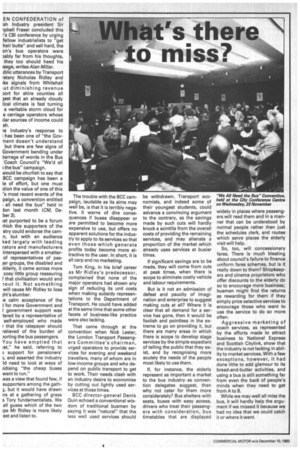EN CONFEDERATION of sh Industry president Sir lpbell Fraser concluded
Page 46

If you've noticed an error in this article please click here to report it so we can fix it.
this .'s CBI conference by urging fellow industrialists to "get heir butts" and sell hard, the on's bus operators were )ably far from his thoughts, they too should heed his ;sage, writes Alan Millar.
Jblic utterances by Transport -etary Nicholas Ridley and Ike signals from Whitehall let diminishing revenue port for shire counties all 3est that an already cloudy tical climate is fast turning a veritable storm cloud for e carriage operators whose ilar sources of income could sh.
ie industry's response to has been one of "the Gov-nent doesn't understand but there are few signs of Government bending under barrage of words in the Bus Coach Council's "We'd all the bus" campaign.
Nould be churlish to say that BCC campaign has been a Le of effort, but one must Alan the value of one of this 's most recent events of the paign, a convention entitled all need the bus" held in ion last month (CM, Deber 3).
iat purported to be a forum fhich the supporters of the stry could endorse the camn, but with an audience ked largely with leading rators and manufacturers interspersed with a smatterof representatives of pasjer groups, the disabled and )Iderly, it came across more cosy little group reassuring I that civilisation would end lout it. Not something will cause Mr Ridley to lose iht's slumber.
le calm acceptance of the I for more Government and I government support was tered by a representative of self-employed who made
r that the ratepayer should relieved of the burden of )orting the bus passengers. You have emptied that :et," he said, referring to 3 support for pensioners' 5, and asserted the industry Id need to look at ways of ;idising "the cheap buses want to run."
as a view that found few, if supporters among the gath3, but it would have drawn irs at a gathering of grass s Tory fundamentalists. We all guess which of the two ips Mr Ridley is more likely eet and listen to. The trouble with the BCC campaign, laudable as its aims may well be, is that it is terribly negative. It warns of dire consequences if buses disappear or are permitted to become more expensive to use, but offers no apparent solutions for the industry to apply to its services so that even those which generate profits today become more attractive to the user. In short, it is all carp and no marketing.
Tom King, in his brief career as Mr Ridley's predecessor, complained that none of the major operators had shown any sign of reducing its unit costs when making subsidy representations to the Department of Transport. He could have added at the same time that some other facets of business-like practice were also lacking.
That came through at the convention when Nick Lester, the London Transport Passengers Committee's chairman, urged operators to provide services for evening and weekend travellers, many of whom are in low-income groups and who depend on public transport to get to work. Their needs clash with an industry desire to economise by cutting out lightly used services at those times.
BCC director-general Denis Quin echoed a conventional wisdom of traditional busmen by saying it was "natural" that the less well used services should be withdrawn. Transport economists, and indeed some of their youngest students, could advance a convincing argument to the contrary, as the savings made by such cuts will hardly knock a scintilla from the overall costs of providing the remaining services, and may alienate a proportion of the market which already uses services at busier times.
If significant savings are to be made, they will come from cuts at peak times, when there is scope to eliminate costly vehicle and labour requirements.
But is it not an admission of defeat and paucity of imagination and enterprise to suggest making cuts at all? Where it is clear that all demand for a service has gone, then it would be foolish and pointless in the extreme to go on providing it, but there are many areas in which there is scope to develop stage services by the simple expedient of telling the public that they exist, and by recognising more acutely the needs of the people most likely to use them.
If, for instance, the elderly represent as important a market to the bus industry as convention delegates suggest, then why not cater for them more considerately? Bus shelters with seats, buses with easy access, drivers who treat their passengers with consideration, bus timetables that are displayed widely in places where passengers will read them and in a manner that can be understood by normal people rather than just the schedules clerk, and routes which serve places the elderly visit will help.
So, too, will concessionary fares. There is much bleating about council's failure to finance uniform fares schemes, but is it really down to them? Shopkeepers and cinema proprietors who offer discounts to the elderly do so to encourage more business; busmen might find the returns as rewarding for them if they simply price selective services to encourage those who want to use the service to do so more often.
Aggressive marketing of coach services, as represented by the efforts made to attract business to National Express and Scottish Citylink, show that the industry is not lacking in ability to market services. With a few exceptions, however, it had done little to add glamour to its bread-and-butter activities, and using a bus is still something far from even the back of people's minds when they need to get from A to B.
While we may well all miss the bus, it will hardly help the argument if we missed it because we had no idea that we could catch it or where it went.












































































































